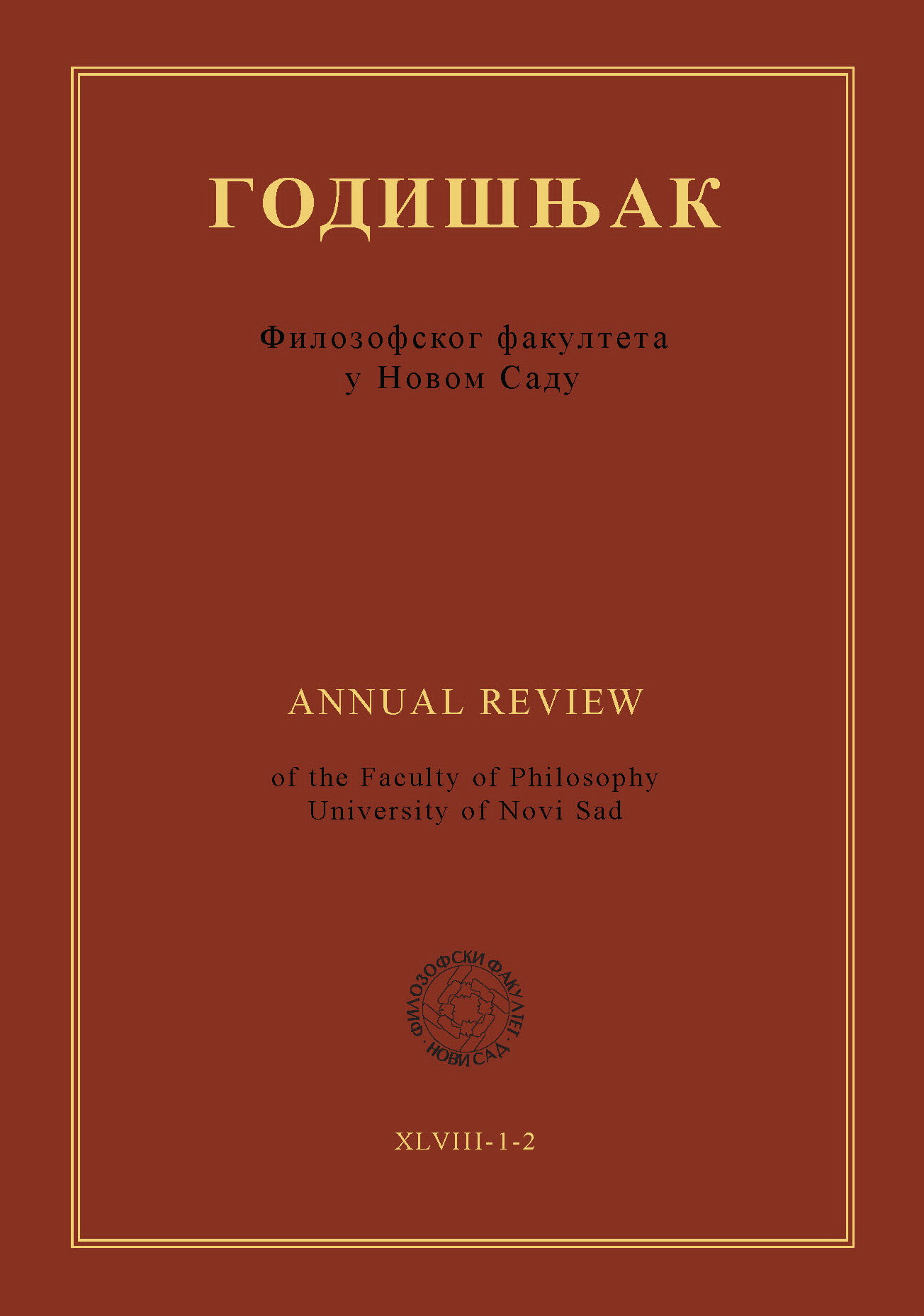CONCEPTUALIZATION OF ENVY IN SERBIAN AND RUSSIAN LANGUAGE AND CULTURE
Main Article Content
Abstract
In this paper was performed a comparative analysis of the associative fields of the lexeme-stimulus zavist in Serbian and зависть in the Russian languages. In the research of the concept was applied a linguistic-conceptual approach. Through the analysis of verbal associations was obtained the actual content of the awareness of the speakers of the two languages about the concept of envy. The results showed that in the Serbian and Russian languages the dominant cognitive feature of the concept of envy is a negative personality trait, which means that envy is seen as a more permanent feature, not a momentary emotion. In the Russian language, the dominant feature is the negative qualification of envy through the conceptual association with the black color black. In the Serbian language the second most common cognitive feature is envy as a negative emotion, and in Russian, envy is in second place as a negative trait, and emotions are in the third place in terms of representation. In both linguistic cultures, the conceptualization of envy also includes a negative evaluation of the term, a connection with the Christian tradition that views envy as a sin, conceptualization through metaphors, color symbolism and the conceptualization of envy as a factor in interpersonal relations, which often occurs in close relationships and between people who are often in contact, and its subject is mainly material and professional achievements.
Downloads
Article Details

This work is licensed under a Creative Commons Attribution-ShareAlike 4.0 International License.
References
Apresi͡an, I͡U. D. (1995). Izbrannye trudy, tom II. Integralʹnoe opisanie i͡azyka i sistemnai͡a leksikografii͡a (originalni rad objavljen ćirilicom). Moskva: «I͡Azyki russkoĭ kulʹtury».
Beskova, T. V. (2018). Problema zavisti v sovremennoĭ sot͡siogumanitarnoĭ nauke (originalni rad objavljen ćirilicom). World of Science. Pedagogy and psychology, No 1, Vol 6. Preuzeto sa https://mir-nauki.com/PDF/40PSMN118.pdf
Milivojević, Z. (2005). Psihoterapija i razumevanje emocija. Novi Sad: Prometej.
Rozenova, M. I (2014). Proektivnye mekhanizmy zavisti (originalni rad objavljen ćirilicom). Vestnik MGOU. Serii͡a «Psikhologicheskie nauki», 1, 30–40.
Sternin, I. A., & Popova Z. D. (2005). Osnovnye cherty semantiko-kognitivnogo podkhoda k i͡azyku (originalni rad objavljen ćirilicom). U: Karasik, V. I., Попова З. Д. (2005). U: Karasik, V. I., & Sternin I. A (ured.) (2005). Antologii͡a kont͡septov. Tom 1. Volgograd: Paradigma, 7–10.
Sternin, I. A., & Karasik, V. I. (2008). Kak opisyvatʹ kont͡septy (originalni rad objavljen ćirilicom). U: Karasik, V. I., & Sternin, I. A., (ured.) (2008). Antologii͡a kont͡septov. Tom 6. Volgograd: Paradigma, 26–35.
Sternin, I. A., & Rudakova, A. V. (2011). Psikholingvisticheskoe znachenie slova i ego opisanie (originalno izdanje objavljeno ćirilicom). Lambert.
Shakhovskiĭ, V. I. (2009). I͡Azyk i ėmot͡sii v aspekte lingvokulʹturologii (originalno izdanje objavljeno ćirilicom). Volgograd: Izdatelʹstvo VGPU «Peremena»
Ufimt͡seva N. V.–Rudakova, A. V.–Sternin, I. A.–Debrenn M. & Butakova, L. O. Aktualʹnye problemy provedenii͡a i interpretat͡sii rezulʹtatov psikholingvisticheskikh ėksperimentov (originalni rad objavljen ćirilicom). U: Rudakova, A. V. (ured.) (2016). Psikholingvistika i leksikografii͡a. Voronezh: Istoki, 4–20.
Volkova, I͡A. A. (2013). Obraznai͡a sostavli͡ai͡ushchai͡a ėmot͡sionalʹnogo kont͡septa «zavistʹ» v russkom i͡azyke (originalni rad objavljen ćirilicom). Teoreticheskie i prikladnye aspekty izuchenii͡a rechevoĭ dei͡atelʹnosti, Vyp. 1 (8), 55–61.
IZVORI
Karaulov, I͡U. N. (red.) (1994). Russkiĭ assot͡siativnyĭ slovarʹ. Preuzeto 20. avgusta 2023, sa http://tesaurus.ru/dict/
Kulišić, Š.–Petrović, P. Ž. & Pantelić N. (1970). Srpski mitološki rečnik. Beograd: Nolit.
Matešić, J. (1982). Frazeološki rječnik hrvatskoga ili srpskog jezika. Zagreb: IRO «ŠKOLSKA KNJIGA».
Meshcheri͡akov, B. G., & Zinchenko, V. P. (2002). Bolʹshoĭ psikhologicheskiĭ slovarʹ (originalno izdanje objavljeno ćirilicom). Sankt-Peterburg: Praĭm-EVROZNAK.
Nikolić, M. (ured.) (2011). Rečnik srpskoga jezika (originalno izdanje objavljeno ćirilicom). Novi Sad: Matica srpska.
Ozhegov, S. I., & Shvedova, N. I͡U. (2010). Tolkovyĭ slovarʹ russkogo i͡azyka (originalno izdanje objavljeno ćirilicom). Moskva: OOO «A TEMP»
Piper, P.–Dragićević, R., & Stefanović M. (2005). Asocijativni rečnik srpskoga jezika (originalno izdanje objavljeno ćirilicom). Beograd: Beogradska knjiga, Filološki fakultet, Službeni glasnik.
Trebješanin, Ž. (2000). Rečnik psihologije. Beograd: Stubovi kulture.




